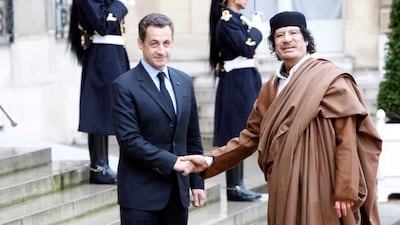The regime of former Libyan leader Muammar Qaddafi has contributed to presidential campaigns in the US, Ukraine and France, reported Asharq Al Awsat newspaper on Monday.
The report said that the Qaddafi government put $5 million towards the campaign of a candidate who was running in the 2004 US elections. Another €4m was spent on the campaign of Yulia Tymoshenko, who ran in the 2010 Ukraine elections, it added.
The report also reiterated that Qaddafi spent almost €50m to fund the presidential campaign of Nicolas Sarkozy in 2007.
French-Lebanese businessman Ziad Takieddine, who was present at Mr Sarkozy’s meeting with Qaddafi, said the “figures were much higher than that”, according to the daily.
Mr Sarkozy has repeatedly denied taking money from Qaddafi, who was captured and killed in 2011 after being deposed.
A close aide of Saif Al Islam — Qaddafi’s son, who was part of his father’s inner circle — said he was present during closed-door meetings between French and Libyan officials.
Mr Sarkozy had promised improved ties between France and Libya in return for the funding, he told the paper on condition of anonymity.
Read more: Britain arrests French suspect in Sarkozy financing probe
Negotiations reportedly took place at the Corinthia Hotel Tripoli and included discussions on dropping the case of the 1989 UTA Flight bombing that implicated Qaddafi’s brother-in-law, Abdullah Al Senussi.
"Of course Sarkozy was interior minister before he was elected president. He had arrived in Libya at the insistence of his aide, Claude Gueant, as well as Takieddine," the source told the paper.
"We felt while talking with him that he had great ambitions to become president of France. He asked for support from Libya to fund his campaign."
The US candidate was financed through a mediator, who was a close friend of Saif Al Islam and the US official, reported Asharq Al Awsat.
“The candidate had pledged to Tripoli that if he should win the elections, he would remove Libya off terrorism blacklists,” the newspaper reported.
“The financing of his campaign took place through transferring funds through a third country.
“The agreement between the Libyans and Americans took place after a meeting in the US city of Toledo in Idaho.”
Meanwhile, Al Islam’s aide said that he personally delivered funds for Ms Tymoshenko’s campaign.
“I had them in a briefcase and I travelled to Ukraine on a private jet. I arrived at Kiev airport and delivered the case to the deputy prime minister,” he said.

